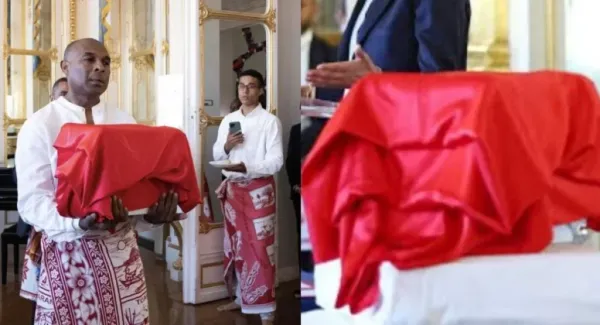
Highlights
- France returns king tora skull madagascar: 128 years later, France returned the skulls of King Tayera and his fighters to Madagascar.
- In 1897, the French Army carried out the Ambiki massacre in the Meenabe region of Madagascar.
- King Tayera was killed and his head was sent to Paris, who became a symbol of colonial violence.
- France took the step of historic return by considering these remains as a symbol of colonial atrocities.
- In Madagascar, these skulls will now be given a funeral.
The colonial history of Madagascar located on the east coast of Africa says stories of cruelty and vandalism, which still refresh the wounds of the society there. France returns king tora skull madagascar The incident not only exposes one of the most painful chapters in history, but it also exposes the truth of the colonial era violence, exploitation and the struggle for identity. After a long wait of 128 years, France returned the skulls of King Toera and his fighters to Madagascar. This incident writes a new chapter in the relationship between the two countries and is like hearing colonial wounds.
Historical Background and Colonial Age of Madagascar
Madagascar was ruled by the Merina Empire in the early 19th century. King Radama I encouraged the spread of Christianity by befriending the British, while her widow queen Ranwalona I opposed foreign intervention. After his death, the influence of European powers gradually started increasing. In 1895, France captured the capital Tananarivo and declared Madagascar officially colonized in 1897.
France returns king tora skull madagascar This story is part of this period, when colonial ambition shook the roots of local culture and society.
Ambiki massacre: examples of vandalism
Raja Tayera, the leader of the Sakalawa community of the Manabe region, was a staunch opponent of foreign rule. In August 1897, the French army attacked Ambiki village. According to reports, Raja Taier had expressed his desire to surrender, but despite this, French soldiers attacked innocent villagers.
About 2,500 people were killed in this attack on the night of 29-30 August 1897. King Tayera and many of his fighters also died in this massacre. The colonial soldiers cut the head of the king to Paris to demonstrate the imperialist victory. This incident is still considered a black chapter of colonial history.
Skulls became colonial symbols
In the National Museum of Natural History of Paris, these skulls remained for 128 years. French Culture Minister Rashida Dati recently admitted that these remains are a symbol of violent and inhuman form of colonialism.
France returns king tora skull madagascar Returning these skulls under the campaign is considered a historical step. Madagascar’s Culture Minister Valamiranti Donna Mara said, “These remains were like an open wound in the heart of our island. Now their return will relax the soul of our society.”
Historical responsibility of France
French President Emmanuel Macron publicly apologized for colonial violence during the Madagascar visit in April 2025. This step is being considered as fulfillment of the same promise.
In fact, in 2017, France announced that cultural heritage and human remains, which were taken from Africa during the colonial period, would be returned. This process not only reflects the historical responsibility of colonial countries, but it is also inspiring countries that are struggling with the legacy of colonialism.
Last farewell in Madagascar
These skulls will now be displayed in Madagascar and then buried according to local traditions. On August 30, his final farewell will be given with traditional rituals in the Bora region.
France returns king tora skull madagascar This incident has become a symbol of respect and identity for Madagascar. Now these are not only the remains, but the voice of the demand for struggle, sacrifice and justice.
Global debate on colonial violence
This move of France has deepened the debate on colonialism and historical injustice globally. There is also a demand from Britain and other European countries to return the heritage and human remains looted from African and Asian countries.
France returns king tora skull madagascar Not only will strengthen the relationship between France and Madagascar, but it will also give history an opportunity to understand in the right perspective.
Symbol of restoration of cultural heritage
The skulls of King Tayera and his fighters are lively proof of colonial atrocities. Now that she has returned to her homeland after 128 years, it is not just a return but symbolizing the restoration of cultural heritage and filling colonial wounds.
This incident has forced historians, cultural activists and human rights organizations to wonder whether history can only be covered in books or it is true justice to return their actual heritage.
France returns king tora skull madagascar The event provides an opportunity to write history again. It reminds the injustice of the colonial period and gives the message that even though the justice is found late, but its echo is always. This return is not only for Madagascar, but also for countries around the world who are still carrying the burden of colonial heritage.
-
Wanindu Hasaranga returns as Sri Lanka unveil 16-member Asia Cup 2025 squad

-
From Ghar Wapasi to Pop Kaun?, check out these complete family drama web series on OTT platform, streaming on…

-
Who is Dubai’s Princess Sheikha Mahra? How rich is she? know how she earns money, her net worth is…

-
Taylor Swift’s Wedding Dress: What will the pop icon wear while walking down the aisle— and which designers could create the look?

-
E20 in our tanks is better? Seriously?
